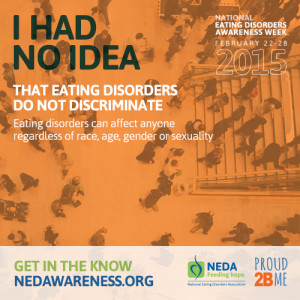Eating Disorders Do Not Discriminate
February 23rd, 2015 by Sara Upson
It’s National Eating Disorder Awareness Week and My Signature Nutrition is partnering with the National Eating Disorder Association to bring awareness about eating disorders to East Texas. Today’s focus is on the diverse group of people who are affected by eating disorders. Many people continue to believe that eating disorders only affect young, white women- when that is not the case.
Eating disorders are serious, brain-based, biological illnesses and they do not discriminate. They affect all genders, ages, and ethnicities. The idea that eating disorders only affect a certain group of people prevents those who are suffering from getting help. Here’s the facts about eating disorders:
Men:
- While 30 million people in the United States suffer from an eating disorder. 10 million of those individuals are male.
- 43% of men are disturbed with their body.
- Men suffer from Anorexia Nervosa, Bulimia Nervosa, Binge Eating Disorder and Eating Disorder Not Otherwise Specified/ Otherwise Specified Feeding and Eating Disorder.
- Men are less likely to get help due to gender role conflicts and negative attitudes toward seeking help.
Race, Ethnicity, & Culture:
- The prevalence of eating disorders is similar among Whites, Hispanics, African-Americans, and Asians in the United States, with the exception that Anorexia Nervosa is more common among Non-Hispanic Whites.
- In a 1994 study on eating disorders in minority populations: 71.5% reported preoccupation with the desire to be thinner, 71.5% reported being “terrified” of being overweight, 52% reported feeling guilty after eating, and 39% stated that food controls their lives.
- A study from 2000 suggested that African-American girls may be especially vulnerable to developing eating disorders with binge eating.
- Another study from 2000 suggested that second-generation Mexican-American women had the highest disordered eating patterns.
Age:
- Age does not protect against eating disorders or disordered eating.
- 62% of women over the age of 50 felt their weight or shape had a negative impact on their life.
- 13% of women over 50 displayed eating disorder symptoms.
- In 2000, 1/3 of all inpatient admissions to a specialized eating disorder treatment center were for women over 30 years old. (And, the numbers have only increased since then.)
Source: http://www.nationaleatingdisorders.org/diversity
Take a free eating disorder screening here: http://www.mybodyscreening.org







Leave a Reply